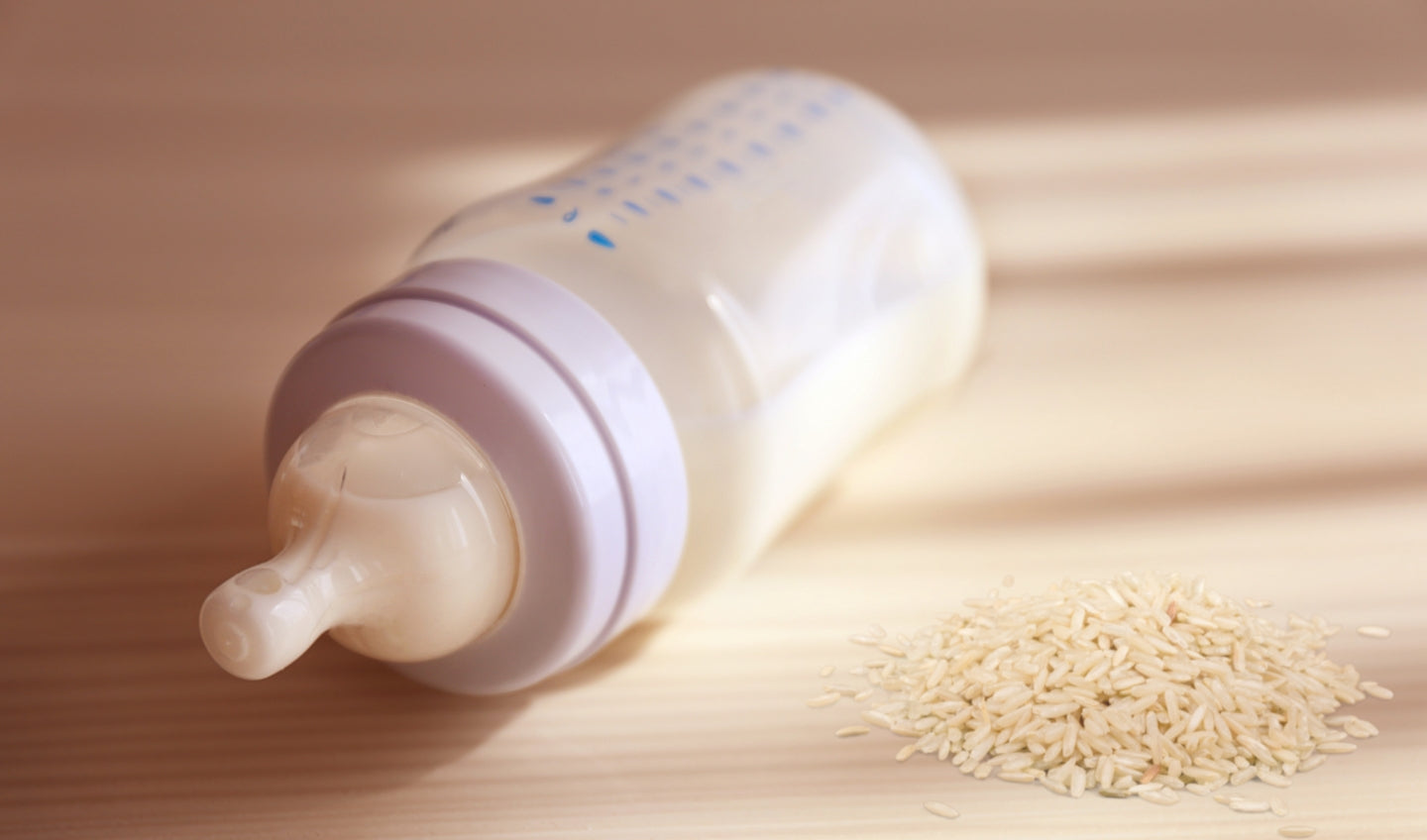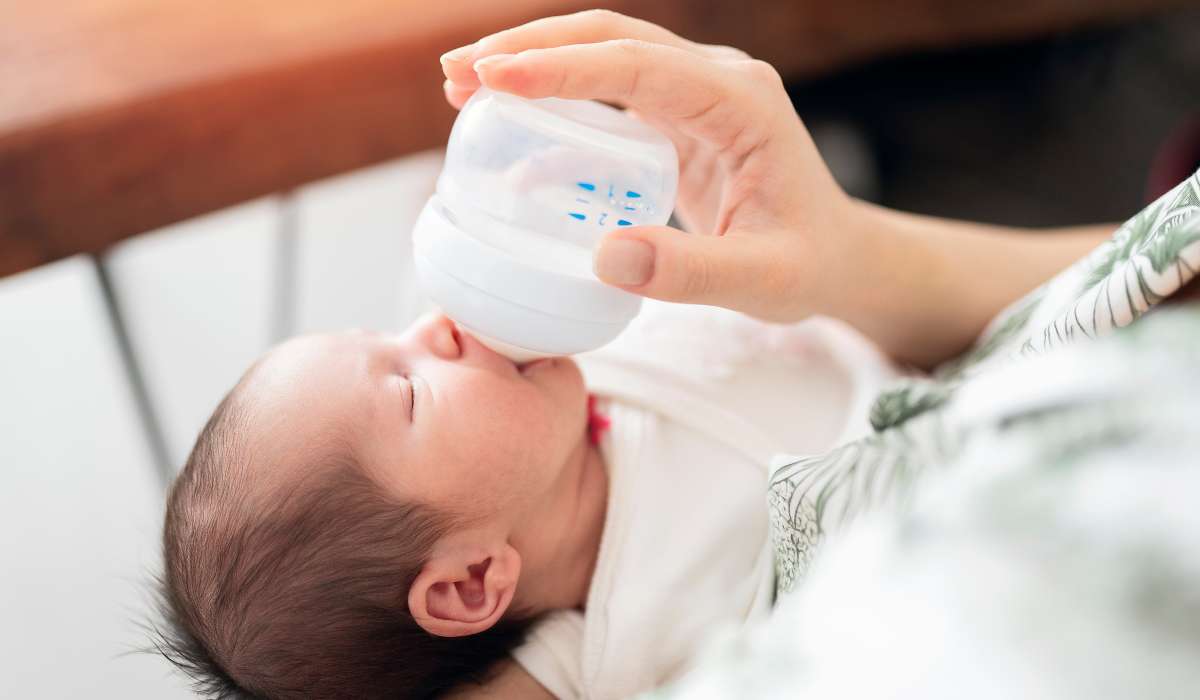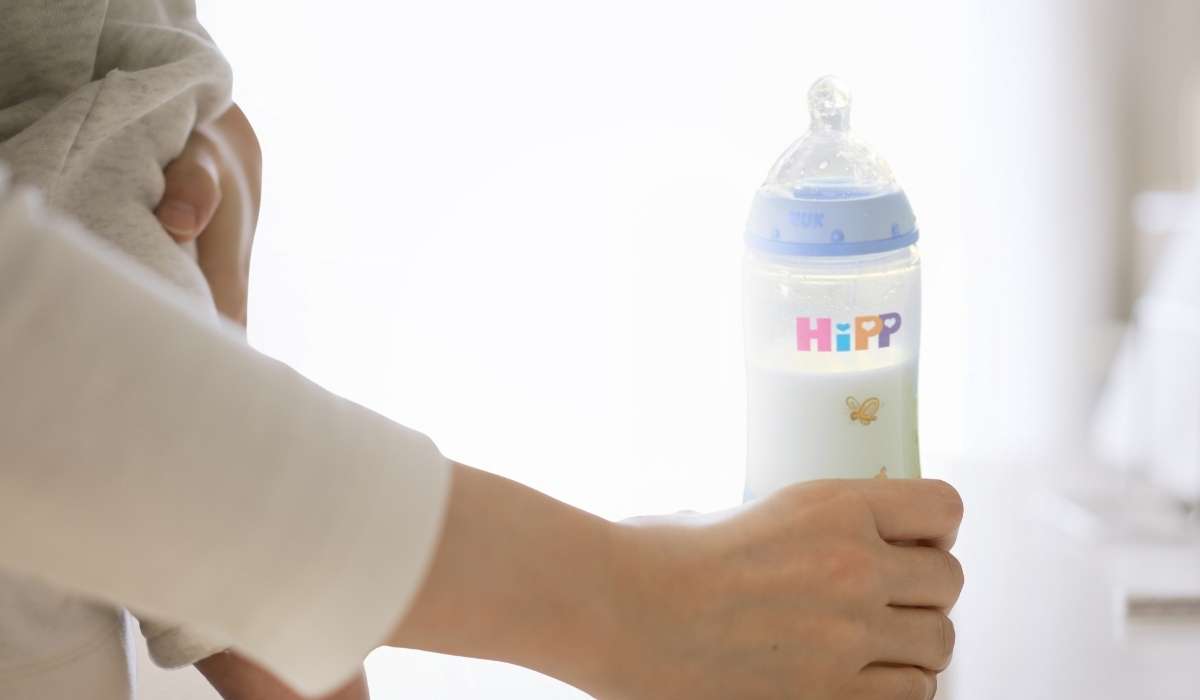Putting cereal in a baby's bottle is an old trick people mistakenly thought would help infants sleep better or fight reflux, but this practice should remain in the past. Today we're sharing the truth about rice cereal in infant formula, its pros and cons, and the potential risks of this controversial practice.
Contents
- Reasons Parents Consider Adding Rice Cereal to Formula
- Expert Opinions: Nutritionists and Pediatricians on Adding Rice Cereal to Formula
- Will Adding Rice to My Baby's Bottle Alleviate Reflux?
- Rice Cereal's Impact on Sleep: Separating Fact from Fiction
- The Verdict: Should You Add Rice Cereal to Formula?
- Alternatives to Adding Rice Cereals to Formula
- FAQs About Adding Rice Cereal to Formula
Reasons Parents Consider Adding Rice Cereal to Formula
Many parents mix rice cereal with baby formula because they believe it offers certain benefits. In this section, we will look closer at these supposed benefits and debunk these myths once and for all!

• Improved sleep. Some parents believe using rice cereal can help their babies sleep longer during the night and wake up less frequently to feed. Despite many anecdotal reports of improved sleep, no research conclusively backs this up, and as such, it's not advisable to use cereal in your baby's bottle to help them sleep.
• Reduced risk of reflux issues. It sounds logical that if you add rice cereal to infant formula, the milk will be heavier and might sit better in your baby's belly, potentially reducing the number of reflux episodes. However, this practice should be avoided unless recommended by your pediatrician due to the increased risk of choking and the potential of consuming too many calories.
• An additional source of iron. Rice cereal can bring extra minerals "to the table," which is why many parents add it to baby formula. That being said, infant formula is already fortified with the iron your baby needs and solids should not be introduced before four months of age and not in your baby's bottle.
• Reduced allergy risk. Rice doesn't typically trigger food allergies, unlike gluten in wheat, making some parents think that rice cereal is a good addition to the baby's diet (especially when trying to introduce solid food). While it's true that rice is low in allergens, rice cereal should be offered in a bowl, not a bottle and never before four months of age.
At first glance, it can seem like a good idea to start adding rice cereal to your little one's bottle. But here's the deal: these supposed benefits of rice cereal do not have any scientific ground to support them. The reality is, in many cases, rice cereal can do more harm than good, which we will discuss in more detail below.
Expert Opinions: Nutritionists and Pediatricians on Adding Rice Cereal to Formula
If you have taken anything away from this article so far, we hope you now know that adding infant cereal to your baby's formula is not a good idea. Due to safety concerns, most infant health experts advise parents against this practice.
The theoretical benefits of mixing rice cereal with formula or breast milk don't hold up to scientific scrutiny.If you want to introduce rice cereal to your baby's diet, it's best to wait until your little one turns 4-6 months and is ready to start eating solid foods.

If you want to mix cereal with formula to help your baby sleep longer, you might consider this trick pretty logical: adding cereal means more calories, leading to a less hungry baby at night, right?
Well, surprisingly not; science tells us young babies are naturally wired to wake up at least every 5 hours. Thus, adding cereal to the bottle won't prevent these normal nighttime wakings.
Plus, this old-fashioned practice has multiple drawbacks and raises many concerns. For example, mixing rice cereal with formula or breast milk can increase the risk of choking (due to cereal chunks in the bottle).
Additionally, if you introduce solid foods and baby rice cereal too early, this may increase the chances of health problems and behavioral complications.
For instance, your baby may have issues with hunger self-regulation in the future, or they may gain too much weight due to an increased caloric intake. Not only that, but swapping your baby's bottle for solid food too soon may lead to an increased risk of diarrheal disease. Thus, waiting until your baby is at least four months before starting solid foods is advisable.
A concern about rice cereal specifically is arsenic exposure. Arsenic is a natural environmental component that can contaminate soil and crops. Rice, in particular, is good at absorbing arsenic due to how it's grown. That means there's a chance even baby cereal may contain it.
Although FDA regulates arsenic, for which the upper limit is currently 100 parts per billion (ppb), most rice cereals have an average arsenic content of 103 ppb. But let's not forget that the average number means some cereals contain more, and some contain less. Thus, some options, such as brown rice cereal, should be avoided due to their higher likelihood of contamination.
Will Adding Rice to My Baby's Bottle Alleviate Reflux?
If you want to feed cereal to your little one to help them with reflux, we've got bad news: You probably won't get the results you're hoping for.
Yes, it's true that rice cereal can make the formula thicker. Rice cereal is not a special agent for managing reflux. Thus, if your baby is dealing with severe reflux, they may require a specialized formula containing ingredients that affect the gastrointestinal tract to keep milk in their belly.
Rice Cereal's Impact on Sleep: Separating Fact from Fiction
Does eating cereal help you sleep better? The question sounds a bit funny, doesn't it? Well, it's the same for your baby. Adding cereal to their bottle might make them feel fuller, but it's not likely to affect their sleep.
The thing is, babies' circadian rhythms make them wake up frequently. Usually, young babies can't sleep for more than 5 hours at a time.
So, even if your little one goes to bed after consuming more calories, they will still wake up in the middle of the night. This is because babies are naturally wired to wake up to feed, and putting rice cereal in their bottles doesn't prevent that.
The Verdict: Should You Add Rice Cereal to Formula?
Experts and medical professionals agree that your baby's bottle shouldn't contain anything except formula or breast milk. This applies not only to rice but to other single-grain cereals. If you want to introduce cereal to your baby's diet, it's best to wait until they turn at least four months.
Now we understand most parents are looking for ways to help their babies sleep or deal with the occasional reflux issue, but putting rice cereal in a bottle is not the solution. It has more drawbacks than benefits and is not backed by science.
You should consult your pediatrician instead of adding something extra to your baby's bottle. A healthcare professional will share safe alternatives to meet your little one's needs. They can also provide specific formula recommendations. This means you will get personalized advice and the best solutions for your baby's development!
Alternatives to Adding Rice Cereals to Formula
You can try a specialized thickened anti-reflux formula with your doctor's recommendation if your baby develops reflux when bottle-feeding. HiPP Anti-Reflux (AR) can be an excellent solution in this case!

This special baby formula contains natural thickening agents meant to control reflux. It's also rich in prebiotics and probiotics to support your baby's digestive health.
You can also try managing reflux by burping your baby after each feeding, avoiding giving them too much formula or breast milk at a time, and keeping your little one upright for around 30 minutes after each feeding. Chances are, these little tricks will make you forget about rice cereal altogether.
If you're at all concerned about the contamination of rice cereal when transitioning to solid foods, you can try oat, barley, and mixed-grain cereals that are lower in arsenic but can still be a valuable source of iron!
Also, make sure you don't start your baby's exposure to new food and solids too early. Experts recommend waiting until your little one turns at least four months old before introducing solid foods.
FAQs About Adding Rice Cereal to Formula
If you have some more questions about putting rice cereal in formula, here are some quick answers to clear things up:
1. Can adding rice to my baby's bottle help with reflux?
No. Rice isn't a component that works to affect your baby's gastrointestinal tract. Thus, it's not likely to help manage reflux.
2. What potential issues can arise from adding cereal to baby formula or breast milk?
Adding cereal to breast milk or formula can pose a choking hazard and increase the risk of certain health issues. They may include lung problems (aspiration risk), abdominal discomfort, constipation, excessive weight gain, impaired hunger self-regulation, and intestinal issues.
3. Can rice cereal cause constipation or other digestive issues?
Yes, rice cereal can potentially cause constipation, abdominal discomfort, and other issues in babies younger than 4-6 months.
4. How much rice cereal should I add to the formula?
Most experts agree you should not add rice cereal to your baby's formula.
5. Are there other types of cereal that can be added to formula?
Any cereal can cause side effects and health issues when mixed with breast milk or formula.
Wrapping Up: Is it safe to introduce rice cereal into the bottle?
Let's face it: Adding rice or any other cereal to your baby's bottle offers more downsides than benefits. So, to be on the safe side, you should seek alternatives. Talk to a pediatrician about your little one's needs.
And never be shy to ask questions, even if they seem silly to you! You know better than anyone that your baby's health is the top priority. Hopefully, today's guide will help you make the best decisions for your little one and their well-being.
Breast milk is the best source of nutrition for babies. Before altering your baby's diet or feeding routine, consult your healthcare provider for personalized recommendations. The information in this article is strictly for informational purposes and is not a substitute for medical advice.





